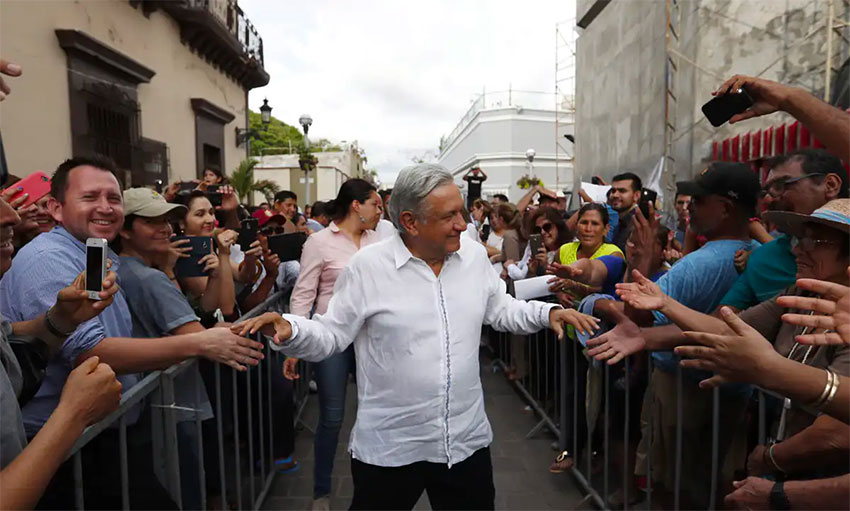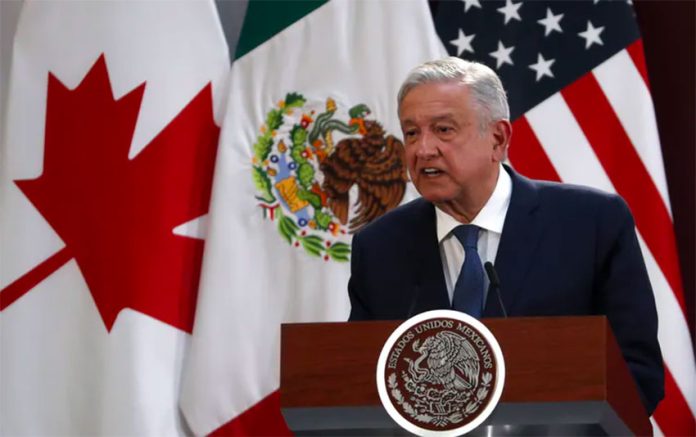Just over a year ago, the first leftist president in Mexico’s modern history took office.
The victory of Andrés Manuel López Obrador, commonly referred to as AMLO, swept aside a longstanding political establishment in a society where most politicians are seen as corrupt and detached from the reality of ordinary citizens.
López Obrador’s victory not only threatened the entrenched political and economic interests that dominated Mexican politics for decades, it also came as a reprieve to an embattled left in Latin America at a time when right-wing forces were on the rise.
The transformative project of the new government, dubbed Mexico’s “Fourth Transformation,” has promised to break with the neoliberal model that had turned the country into the most unequal among OECD nations. This has meant a drastic change in policy priorities.
Under López Obrador, the government no longer promotes investment and job creation at any price. Instead, it announced the largest increase to the minimum wage in 36 years, passed a major labor reform strengthening workers’ rights and ended decades of discretionary tax breaks to large corporations. These measures have unsettled some economic elites, who are now hesitant to invest in a country that is changing the rules of the game.

AP Photo/Eduardo Verdugo
López Obrador seems aware that the surly relations between the government and the private sector can hinder his transformative agenda. Despite his campaign promise of 4% annual growth, the economic scenario in Mexico is daunting. As the country struggles to avoid recession, rating agencies and international organizations are lowering their outlooks for the Mexican economy.
This is why Mexicans were so prompt to ratify USMCA, a renegotiated version of NAFTA, and its subsequent overhaul, despite the free-trade deal being at odds with López Obrador’s anti-neoliberal stance.
The rapid ratification of the trade agreement not only sent a message of certainty to domestic and international investors, it also flagged the limits of the AMLO government when it comes to breaking with Mexico’s neoliberal past.
A second threat to López Obrador’s agenda is the rising levels of insecurity in the country.
The new administration has been unable to contain a wave of violence that it inherited from its predecessors. In fact, 2019 was probably the deadliest year on record in Mexico. The massacre of the LeBaron family — in which six children and three women were murdered in northern Mexico — and the failed attempt to arrest the son of drug lord El Chapo in Culiacán, where the military was outnumbered by cartel gunmen, are just two examples of the government’s incapacity to end the violence.
The president’s abrazos, no balazos (hugs, not bullets) policy has been harshly criticized for its naiveté and has been largely ineffective.
However, one year into leftist rule in Mexico and it’s not all bad news. Despite economic woes and enduring violence, López Obrador’s government has made considerable progress dismantling a system that almost solely benefits the political and economic elite and keeps more than 50 million Mexicans in poverty.
López Obrador started his term by announcing harsh austerity measures to bureaucrats and politicians, including cutting his own salary in half and ditching the presidential mansion, jet and guards.
In a clear break with the past, his government is prosecuting corrupt officials from previous administrations. Social spending is also being revamped. About 18 million youth and elderly Mexicans are now receiving their scholarships and pensions from social programs as cash transfers.
Perhaps most importantly, López Obrador is transforming the perception of political power in Mexico and how it should be used. At most events he attends, the president finds himself surrounded by supporters who cheer and hug their leader without apparent constraints — in contrast to the strong security measures taken by his predecessors when in public.
When asked about his safety, López Obrador confidently replies that it is the people who look after him. Despite his populist tone, he seems to understand that first and foremost, Mexico’s marginalized majorities need to be seen and recognized as part of a society that has excluded them for too long.
If we want to understand the change Mexico is undergoing, we must measure progress with metrics other than the GDP. Only when we gauge it via other methods will we understand the extent to which the political and economic structures that have made Mexico one of the most inequitable countries in the world are being dismantled.
Changing public perceptions about political power might not be as tangible as economic growth and decreasing homicide rates, but its impact on building a more inclusive society are real and every bit as important.
Sergio Daniel Michel Chavez is a PhD student at the Department of Political Science and Institute of Political Economy at Carleton University in Ottawa, Canada. This article is republished from The Conversation under a Creative Commons license. Read the original article.
